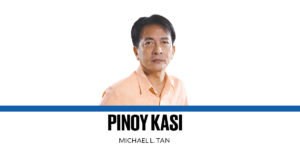The President’s approach to securing support for his so-called “war on drugs” was to encourage liquidations by assuming all responsibility. By saying he would assume all responsibility for any fatalities in police operations, he freed his subordinates of accountability, knowing full well that neither he nor they would ever have to be responsible, so long as they wielded power. Something Rudyard Kipling once wrote boils it down perfectly: “Power without responsibility — the prerogative of the harlot throughout the ages.”
Sen. Bong Go confirmed this when he justified the Vice President’s dismissal as “cochair” of the interagency coordinating committee for anti-illegal drug activities (the post was never formalized by amending the executive order that established the committee). Go said no drug kingpin had been killed, so obviously the Veep was useless, adding that no one got killed because the cops probably believed the Veep didn’t have their back. That this basically confirms the accusations of critics that the President ordered and sustains a policy of mass murder, is apparently something Go and his principal will have to worry about later.
This underscores my colleague John Nery’s valuable observation that the President operates by means of “instinctive political reaction” which his admirers “mistakenly call strategic.” Everyone just took their cue from the President, in the hope volume and volume can turn the ad hoc into something that appears calculated. Let me add my own observation: Bong Go, previously underestimated as a skillful bureaucratic infighter, now finds himself outside his element, as a senator. It’s one thing to take down Leoncio Evasco Jr.; it will be tougher to be just one voice among 24 senatorial voices.
In a nutshell, then, the trap the President supposedly tried to ensnare the Vice President in, by trying to goad her into refusing an appointment, failed because it was a bluff. So the actual trap, which is where his Palace paper-pushers came in, was to give her responsibility without authority. The combination of bluff and a powerless designation took on the appearance of a clever scheme. The President’s switcheroo went like this: He thundered he was prepared to make her “drug czar,” imprinting the title on people’s minds; then he designated her cochair of a mere coordinating committee, denying her any real authority, while saddling her with public expectations of bearing responsibility. As Tom Stoppard, in a modern corollary to Kipling, put it: “Responsibility without power, the prerogative of the eunuch throughout the ages.”
This is why the Veep had to ask for things. Had she been given authority, she could have ordered things. Everyone around her, who owed their positions (and authority) to the President, knew this; she knew it herself, but she knew government well enough to know that merely asking for things can make an inconvenient point. Just how inconvenient was proven by the President pulling the plug on her appointment. The mere act of firing, after all, restores her to a subordinate place.
Leon Ma. Guerrero, reflecting on our inheritance from Spain, paraphrased the findings of the Duke of Maura in criticizing his own nation’s culture with observations Guerrero believed mirrored our own experience: “…analyzing the political landscape of Spain in his Grandeza y Decadencia de España, [he] points out that Spain’s greatest weakness, which we seem to have inherited, is the atrophy of the civic spirit, the lack of civic responsibility, the habit of submission to absolute and irresponsible power. As a result, the word politics has come to mean for some the most pleasant and least demanding of professions; for others the most thrilling and expensive of sports; and for very few the art of knowing, evaluating and serving the national interest.”
Guerrero went on to point out that, “Political power in turn…. is interpreted in terms of satisfying vanity and ambition, of indulging covetousness, of being prodigal with the money of others, of expediting vengeance, of amassing a fortune, of rising in society, in short, of glutting every ignoble appetite…”
Here, in what Guerrero wrote, can be found the clash of approaches to governance that played out, in terms of the President and the Vice President in the so-called “war on drugs.” The President was playing according to a prehistoric — literally — script of chest-thumping, fang-baring chieftainship; the Veep was responding according to methods and means of modern governance. Her point, satisfyingly enough, was ancient: Ang pikon ay laging talo.
mlquezon3@gmail.com


